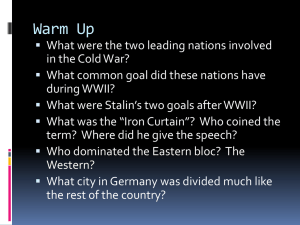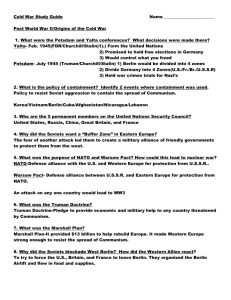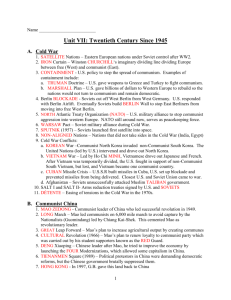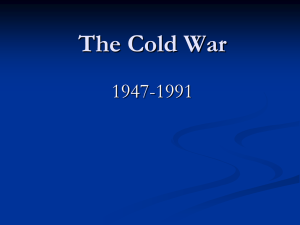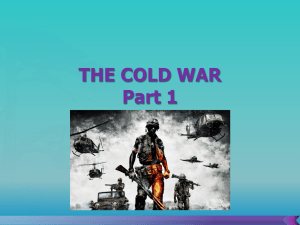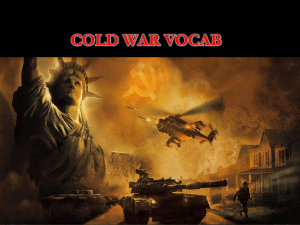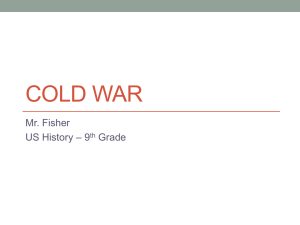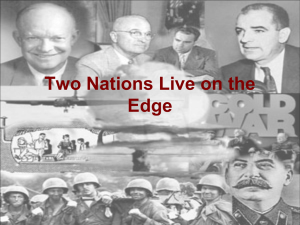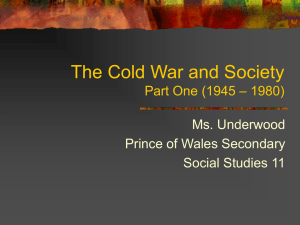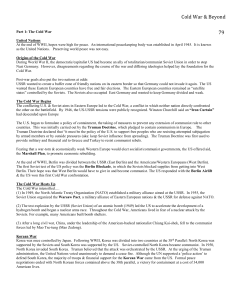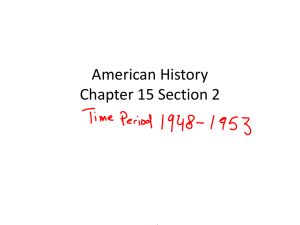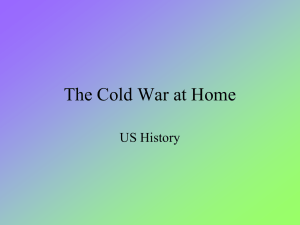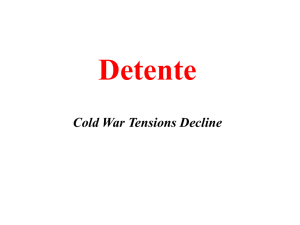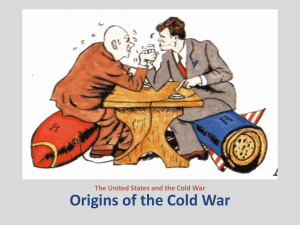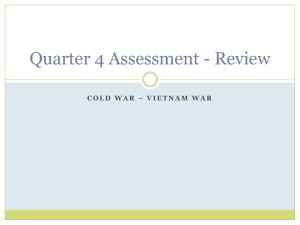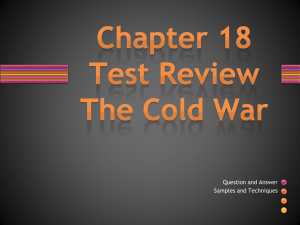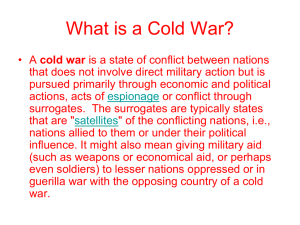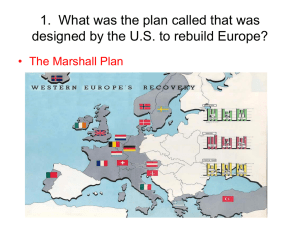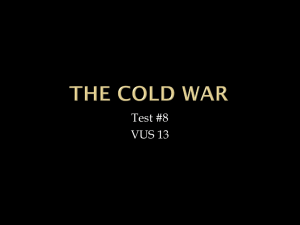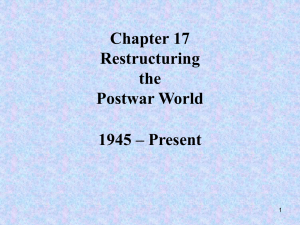Cold War Project
advertisement
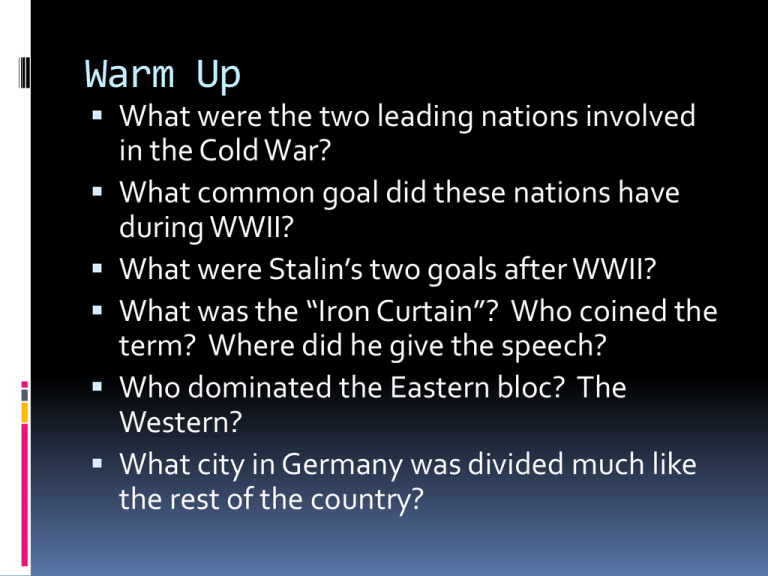
Warm Up What were the two leading nations involved in the Cold War? What common goal did these nations have during WWII? What were Stalin’s two goals after WWII? What was the “Iron Curtain”? Who coined the term? Where did he give the speech? Who dominated the Eastern bloc? The Western? What city in Germany was divided much like the rest of the country? Cold War Project 1. Find the picture or photo on the wall that matches your summary card (there are 22 pictures and 22 summary cards) 1. Draw a simple sketch of the picture or photo at the top or bottom of your paper (pen or pencil) Cold War Project 3. Write 5 to 8 key terms, facts, ideas or concepts from the summary card on your paper (sentences, notes, or outline form). Focus on explaining what occurred, which countries and/or people were involved, and why it was a Cold War event. Cold War Project 4. Repeat steps 1, 2, and 3 for all 22 summary cards 5. Type all 22 summaries (one on each page). Title of event must be at the top of the page, text in the middle, photo or picture at the bottom (picture can be drawn or taken from Clip Art or internet). 6. Your 22 pages must be in chronological order 7. Front of packet must have a title page. Type a table of contents for your second page. Cold War Project 8. Packet must be arranged in a binder or folder (DO NOT STAPLE) 9. All summaries must be in YOUR OWN WORDS. Students with identical summaries will not receive credit. Cold War Project 1. Iron Curtain 2. Truman Doctrine 3. Marshall Plan 4. Berlin Airlift 5. NATO & Warsaw Pact 6. Fall of China 7. Korean War 8. Domino Theory 9. Hungarian Revolt 10. Space Race 11. U2 Crisis 12. Bay of Pigs 13. Berlin Wall 14. Cuban Missile Crisis 15. Vietnam War 16. Springtime in Prague 17. Détente 18. Soviet Invasion of Afghanistan 19. Solidarity 20. Invasion of Grenada 21. Mikhail Gorbachev 22. Massacre at Tiananmen Square Iron Curtain Churchill coins the term, “Iron Curtain” in Missouri Iron curtain refers to the line between democratic and communist nations March 5th, 1946 Truman Doctrine March 12th, 1947 Containment stated that the U.S. would support Greece and Turkey with economic and military aid to prevent their falling into the Soviet sphere Marshall Plan The Marshall Plan was the primary plan of the United States for rebuilding and creating a stronger foundation for the allied countries of Europe, and repelling communism after World War II Named after secretary of state George Marshall 13 billion given to Europe July, 1947 Berlin Airlift June 24th, 1948 Soviets blocked all routes into Berlin No supplies could reach Berlin US drops supplies into Berlin Tensions raised NATO & The Warsaw Pact April 4th, 1949 NATO = North Atlantic Treaty Organization Warsaw Pact = Soviet’s answer to NATO Named after Warsaw in Poland Fall of China October 1949 Shows that Containment is not working Mao Zedong (Communist) vs. Chiang Kai-shek (Nationalist) US gives Chiang Kai-shek money to help fight the Communists Chiang Kai-shek flees to Taiwan Korean War First military conflict that the US participates in to contain communism 38th Parallel divides North and South Korea June 25th, 1950 North Korea invades South Korea No victor in the Korean War Domino Theory 1954 Eisenhower and his secretary of state John Foster Dulles coin this term Nations will fall like dominos if we do not contain communism Hungarian Revolt 1953 Stalin dies Khrushchev takes over and trashes Stalin in a famous speech Khrushchev lets satellite countries have more say in how they run their country Hungary has the greatest reforms Hungary wanted to withdraw from Warsaw Pact Space Race 1957 Sputnik was launched into space Scared the US and jolted our confidence 1958 the Soviets put a dog into space 1961 USSR puts a man into space Kennedy wanted to send a man to the moon U-2 Crisis U-2 Dragon Lady (spy plane) shot down over the Soviet Union Pilot captured and put on trial Francis Gary Powers was the pilot Bay of Pigs April 1961 Kennedy promised to “defend freedom in its hour of maximum danger” “Pay any price, beat any burden” Fidel Castro leads revolution in Cuba and changes their govt. to communist CIA trains Cuban ex-patriots to lead revolution in Cuba Ex-patriots are slaughtered US did not help in the invasion Berlin Wall August 1961 East and West Berlin was divided by barbed wire Not very effective – 1000’s fled Berlin Wall was much more effective Wall becomes ugly symbol of communism Kennedy, “Ich bin ein Berliner” Cuban Missile Crisis “Arms Race” October 14th, 1962 U-2 spy plane takes pictures over Cuba and discovered nuclear missiles Naval blockade Soviets removed missiles US had to promise they wouldn’t invade Cuba US had to remove their missiles from Turkey Vietnam 1965-1973 French colonized in Vietnam Vietnamese leader – Ho Chi Minh North Vietnam = communist South Vietnam = democratic US sends troops to South Vietnam Frustrating war Containment not working Springtime in Prague 1968 Alexander Dubcek – leader of the Czech republic Great reforms against communism Soviets come in and restore their dominance Manifesto Against Aggression Sounds much like the Bill of Rights Brezhnev Doctrine – Soviets could intervene in your govt. at any time Detente French word meaning relaxing or easing 1972 Short lived understanding between communist and capitalistic worlds Nixon travels to Beijing and Moscow Ultimately our differences were too great The US boycotts the 1980 summer Olympics due to the Soviets invasion of Afghanistan Soviet Invasion of Afghanistan December 1979 War between Soviets and Soviets invade Afghanistan Mujahedin This is the Soviet Union’s Vietnam and execute the President and his family Babrak Karmal becomes the new President President Jimmy Carter suspends arms control race, cuts off all grain supplies and boycotts the 1980 Olympic games Solidarity September 1980 Struggle against communist regime in Poland Lech Walesa leads the movement against communism 1981 they call for free elections The Red Army was ready to strike Soviets institute Martial Law and Solidarity is outlawed The Invasion of Grenada October 1983 Maurice Bishop (leader of Grenada) became friendly with Fidel Castro and the communist government Wanted to put a communist airbase on their island Communists kill Maurice Bishop after his visit to the United States Reagan orders the invasion of Grenada Mikhail Gorbachev 1985 Glasnost = openness Perestroika = economic and political reform Free market system introduced Ethnic division and nationalism within the Soviet Union Signs intermediate Nuclear Force (INF) treaty Pulls soldiers out of Afghanistan Berlin Wall is torn down Massacre at Tiananmen Square June 1989 Tiananmen located in Beijing China Communist economy in China very weak Overly harsh and dictatorial government New Communist leader Deng Xiaoping lets in a small amount of capitalism and allows students to study abroad When students get back they protest peacefully at Tiananmen square Chinese military breaks up the protest and kills 500 to 1000 people
